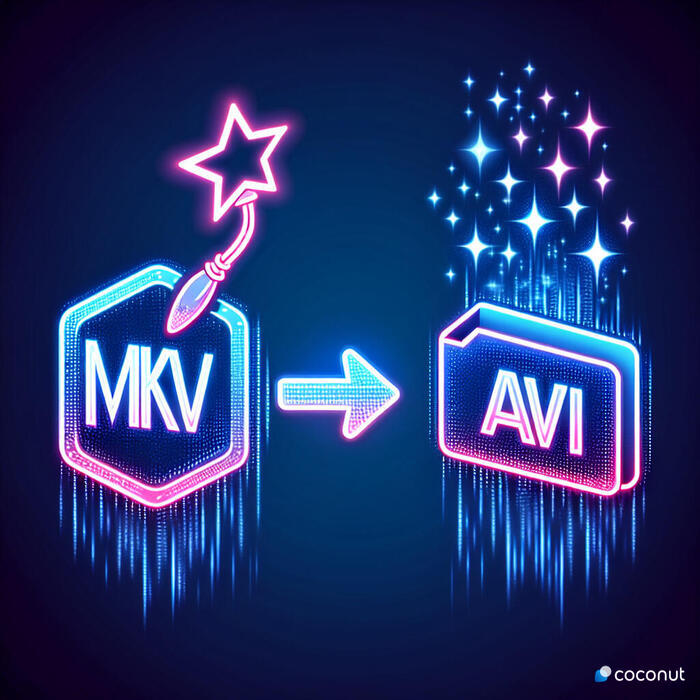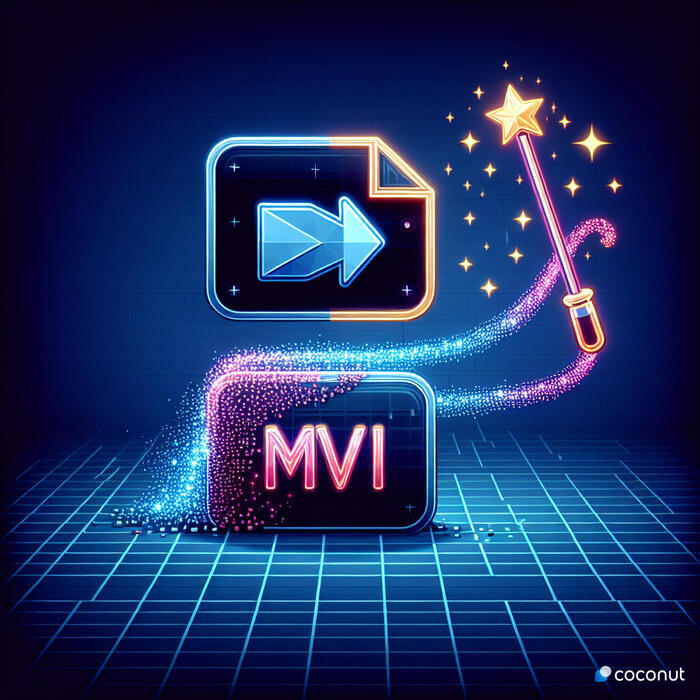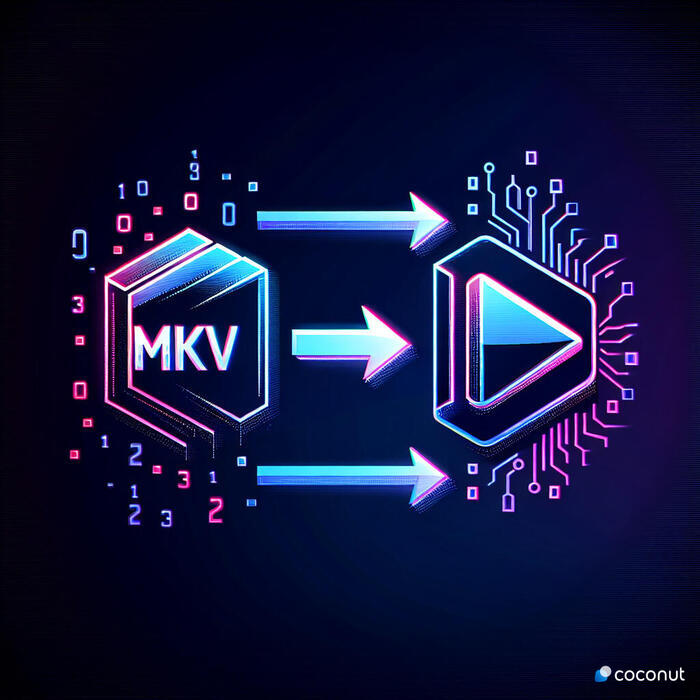In the digital age, video content is king. From streaming platforms to social media, videos are a primary mode of communication and entertainment. However, not all video formats are created equal. Different formats offer varying levels of quality, compatibility, and file size. Two such formats are MKV and AVI. While MKV offers high-quality video and audio, it's not as widely compatible as AVI. This can pose a problem when you want to play your MKV videos on certain devices or platforms. That's where converting MKV to AVI comes in. By converting your MKV files to AVI, you can ensure that your videos will play smoothly on a wider range of devices and platforms. This is especially useful if you're sharing your videos with others or uploading them online. In this article, we'll delve into the world of video formats, focusing on MKV and AVI. We'll discuss what these formats are, their pros and cons, and how they compare. We'll also guide you through the process of converting MKV to AVI, so you can perfect your videos and make them more accessible.

Understanding Video Formats
MKV Format
Let's start with the MKV format. MKV, which stands for Matroska Video, is an open-source multimedia container format. This means it can hold an unlimited number of video, audio, picture, or subtitle tracks in one file. This flexibility makes MKV a popular choice for high-definition videos, including movies and TV shows. One of the main advantages of MKV is its high quality. It supports a wide range of video and audio codecs, allowing for high-definition video and high-quality audio. It also supports features like multiple audio tracks and subtitles, making it a versatile choice for multimedia content. However, MKV is not without its drawbacks. Its high quality often results in large file sizes, which can be a problem for storage and streaming. Furthermore, its compatibility is not as wide as other formats. While it's supported by many media players and platforms, there are still many that don't support MKV. This can limit where and how you can play your MKV videos.
AVI Format
Now, let's move on to the AVI format. AVI, which stands for Audio Video Interleave, is a multimedia container format introduced by Microsoft in 1992. It's one of the oldest video formats and is still widely used today. AVI files can contain both video and audio data, allowing for synchronous audio-with-video playback. One of the main advantages of AVI is its wide compatibility. As a long-standing format, it's supported by almost all media players and platforms. This means you can play your AVI videos on a wide range of devices and platforms without any issues. AVI also offers good quality, although it's not as high as MKV. However, like MKV, AVI files can be quite large, especially for high-quality videos. This can be a problem for storage and streaming. Despite its age, AVI is still a relevant and useful format, especially for its wide compatibility.
Comparison Between MKV and AVI
So, how do MKV and AVI compare? Both are multimedia container formats that can hold video and audio data. However, they differ in several key aspects. In terms of quality, MKV has the upper hand. It supports a wider range of video and audio codecs, allowing for higher-definition video and higher-quality audio. It also supports features like multiple audio tracks and subtitles, which AVI does not. However, in terms of compatibility, AVI wins. As a long-standing format, it's supported by almost all media players and platforms. This means you can play your AVI videos on a wider range of devices and platforms. In terms of file size, both MKV and AVI can result in large files, especially for high-quality videos. This can be a problem for storage and streaming. In conclusion, the choice between MKV and AVI depends on your needs. If you prioritize quality and features, MKV may be the better choice. However, if you prioritize compatibility and accessibility, AVI may be the better choice. And if you have MKV videos that you want to make more accessible, you can always convert them to AVI.

Why Convert MKV to AVI?
Compatibility Issues
The primary reason to convert MKV files to AVI format is to overcome compatibility issues. AVI, an acronym for Audio Video Interleave, is a multimedia container format introduced by Microsoft in 1992 as part of its Video for Windows technology. It is one of the oldest video formats and is widely supported across various platforms and devices. Whether you're using a Windows or Mac computer, an Android or iOS device, or even a smart TV, chances are it supports AVI files. On the other hand, MKV, short for Matroska Video, is a relatively newer and more complex format. It supports a broad range of video, audio, and subtitle codecs, making it highly versatile. However, this versatility comes at the cost of compatibility. Many devices and media players, especially older ones, do not support MKV files. Software compatibility is another concern. While most modern media players can handle MKV files, some popular video editing and conversion tools may not. For instance, if you're using older versions of Adobe Premiere Pro or Final Cut Pro, you might encounter issues when importing MKV files. In contrast, AVI's long-standing presence in the market ensures its compatibility with almost all video-related software. Therefore, converting MKV to AVI can help you avoid these compatibility issues and ensure your videos play smoothly on any device or platform.
File Size Considerations
Another factor to consider when deciding between MKV and AVI is the file size. Generally, MKV files tend to be larger than AVI files. This is because MKV is a container format that can hold an unlimited number of video, audio, picture, or subtitle tracks in one file. It's like a cornucopia of multimedia content, which naturally leads to larger file sizes. On the other hand, AVI files are typically smaller. AVI uses less compression, which can result in larger files, but it also supports fewer codecs and features than MKV. This simplicity often results in smaller file sizes, making AVI a more storage-friendly option, especially if you're dealing with limited storage space. However, it's important to note that the file size also depends on the video's length, resolution, and bitrate. A high-resolution AVI video can still take up more space than a low-resolution MKV video. But all things being equal, AVI files are usually smaller and easier to manage than MKV files.
Quality Preservation
One might wonder if converting MKV to AVI would result in a loss of video quality. The good news is that AVI can preserve the video quality during the conversion process. AVI uses less compression, which means it retains more of the original video data. This results in higher quality videos compared to formats that use more aggressive compression methods. However, it's important to use a reliable and high-quality conversion tool. Some tools might use low-quality conversion algorithms, which can degrade the video quality. But with a good conversion tool, you can convert MKV to AVI without any noticeable loss in quality. Also, AVI's compatibility with various codecs allows you to choose the one that best suits your quality requirements. For instance, you can use a lossless codec if you want to preserve the maximum quality, or a more compressed codec if you need to reduce the file size. In either case, AVI gives you the flexibility to balance quality and file size according to your needs.

How to Convert MKV to AVI
Using Desktop Software
There are numerous desktop software options available for converting MKV to AVI. Some of the popular ones include VLC Media Player, HandBrake, and Freemake Video Converter. To convert using VLC, first, open the software and click on 'Media' in the menu bar. Then select 'Convert/Save', add your MKV file, and choose AVI as the output format. Finally, specify the destination folder and click 'Start' to begin the conversion. HandBrake, another free and open-source tool, offers more advanced options. After opening the software, click 'Open Source' to import your MKV file. Then, under the 'Output Settings' section, select AVI from the 'Format' dropdown menu. You can also adjust the video and audio settings as needed. Once everything is set, click 'Start Encode' to begin the conversion. Freemake Video Converter is a user-friendly option with a straightforward interface. After launching the software, click '+ Video' to add your MKV file. Then, select 'to AVI', choose your desired settings, and click 'Convert' to start the process. While these software options are free, they might include ads or offer additional paid features. Also, the conversion speed and quality can vary depending on the software and your computer's performance.
Online Conversion Tools
If you prefer not to download any software, you can use online conversion tools. Websites like Convertio, Online-Convert, and Zamzar offer free MKV to AVI conversion services. To use Convertio, simply visit the website, click 'Choose Files' to upload your MKV file, select AVI as the output format, and click 'Convert'. The website will then upload and convert your file, and you can download the converted AVI file once the process is complete. Online-Convert and Zamzar work similarly. However, they also offer additional options like video editing, resolution adjustment, and file compression. While online tools are convenient, they also have some drawbacks. The upload and download times can be long, especially for large files. Also, the conversion quality might not be as good as desktop software. Moreover, you need to be careful about privacy and security, as you're uploading your files to a third-party server.
Conversion Tips and Best Practices
To ensure a smooth conversion process, here are some tips and best practices. First, always back up your original MKV files before conversion. This way, if something goes wrong during the conversion, you still have your original files. Second, choose the right tool for your needs. If you're dealing with large files or need high-quality conversion, desktop software might be a better choice. But if you're looking for convenience and don't mind slightly lower quality, online tools can be a good option. Third, pay attention to the output settings. Choose the right codec, resolution, and bitrate according to your needs. Remember, higher settings will result in better quality but also larger file sizes. Finally, be patient. Video conversion can take time, especially for large files or high-quality settings. Don't interrupt the process once it has started, as it can result in corrupted files. By following these tips, you can convert MKV to AVI efficiently and effectively, ensuring your videos play smoothly on any device or platform.

Troubleshooting Common Issues
Conversion Errors
Conversion errors are a common issue that users encounter when converting MKV to AVI. These errors can occur due to a variety of reasons, such as incompatible software, incorrect settings, or issues with the original file. We understand how frustrating these errors can be, especially when you're in the middle of an important project. But don't worry, we're here to help you navigate through these issues.Firstly, ensure that you're using a reliable and compatible conversion software. There are numerous tools available online, both free and paid, that can convert MKV files to AVI. However, not all of them are created equal. Some may not support the MKV format, while others may produce errors due to bugs or outdated software. Therefore, it's crucial to choose a tool that is regularly updated and has positive user reviews.Secondly, check your conversion settings. Each conversion tool has different settings that can affect the output file. For instance, some tools allow you to choose the resolution, bitrate, and other parameters of the output file. If these settings are not configured correctly, it can result in conversion errors. Therefore, make sure to familiarize yourself with these settings and adjust them according to your needs.Lastly, the issue could be with the original MKV file. If the file is corrupted or damaged, it can cause errors during conversion. In this case, try to obtain a new copy of the file or repair it using a file repair tool. If none of these solutions work, consider seeking help from a professional or a tech-savvy friend. Remember, troubleshooting is a process of elimination, so don't give up!
Quality Loss
Quality loss is another common issue that users face when converting MKV to AVI. This is because the conversion process involves compressing the original file, which can result in a loss of quality. However, there are several strategies that you can employ to minimize this loss.Firstly, choose a conversion tool that offers high-quality conversion. Some tools use advanced algorithms to preserve the quality of the original file during conversion. These tools may be more expensive, but the investment is worth it if quality is your top priority.Secondly, adjust your conversion settings. Most conversion tools allow you to customize the output file's resolution, bitrate, and other parameters. By choosing the highest possible settings, you can ensure that the output file retains as much quality as possible. However, keep in mind that higher settings will result in a larger file size.Thirdly, consider the quality of the original MKV file. If the original file is of low quality, the converted AVI file will also be of low quality. Therefore, always try to obtain the highest quality version of the MKV file before conversion.Lastly, remember that some quality loss is inevitable during conversion. However, with the right tools and settings, this loss can be minimized to a level that is barely noticeable.
File Corruption
File corruption is a serious issue that can occur after converting MKV to AVI. This can happen due to various reasons, such as software bugs, power outages, or hardware failures. When a file is corrupted, it becomes unreadable and unusable. However, there are several ways to handle this issue.Firstly, try to open the file with a different media player. Sometimes, the issue is not with the file itself, but with the media player. If the file opens correctly with a different media player, then the issue is likely with the original media player.Secondly, use a file repair tool. There are numerous tools available online that can repair corrupted AVI files. These tools work by scanning the file for errors and attempting to fix them. However, keep in mind that not all errors can be fixed, and some files may be permanently damaged.Thirdly, if the file is still corrupted after using a repair tool, consider converting it again. It's possible that an error occurred during the conversion process, resulting in a corrupted file. By converting the file again, you may be able to avoid this error.Lastly, if all else fails, seek help from a professional. File corruption is a complex issue that can be difficult to resolve without technical knowledge. Therefore, if you're unable to fix the file yourself, it may be best to seek professional help.

Further Readings and Online Resources
Video formats are complicated enough already, but at least we can clear up one of the most common questions - what’s the difference between MKV and MP4 files?





